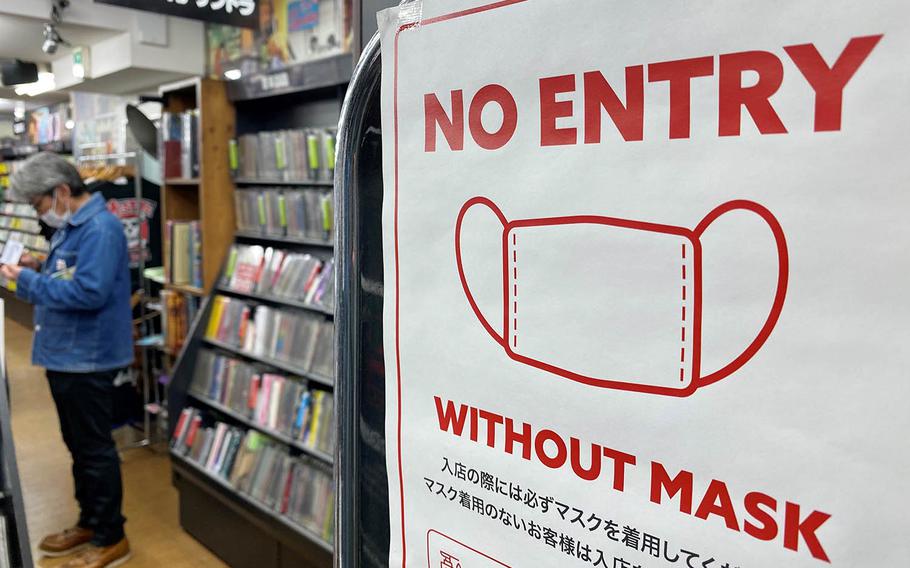
A sign outside a western Tokyo record store warns patrons not to enter without a mask, Sunday, Nov. 22, 2020. (Aaron Kidd/Stars and Stripes)
Stars and Stripes is making stories on the coronavirus pandemic available free of charge. See other free reports here. Sign up for our daily coronavirus newsletter here. Please support our journalism with a subscription.
TOKYO — The U.S. military in Japan recorded several fresh coronavirus infections as it prepared for the long Thanksgiving weekend.
Late Tuesday, Misawa Air Base announced that two people tested positive after recently arriving in Japan via the Patriot Express, a government-chartered passenger air service. Both went directly into isolation, according to the base. A third person, the roommate of an infected individual, was quarantined for observation.
On Okinawa, the U.S. military reported three new coronavirus cases to the local government — one at Kadena Air Base and four at Marine Corps Air Station Futenma — a prefectural public health official told Stars and Stripes by phone Wednesday.
Kadena had not updated its report on Facebook by 6 p.m. Wednesday but typically does so within days of positive tests; the Marines stopped posting their Okinawa cases in early November, though they are listed by U.S. Forces Japan on its website.
Over on the Korean Peninsula, U.S. Forces Korea on Wednesday said a soldier at Camp Humphreys who had been reported as infected the previous day does not have the coronavirus after all.
An administrative error labeled the soldier’s test as positive, according to a USFK press release. Everyone identified as the soldier’s close contacts were cleared to “return to duty without delay.”
U.S. commanders across South Korea and Japan reminded service members, civilian employees and family members to heed good practices heading into the long weekend. For most service members, Friday is also a day off.
The head of USFJ, Lt. Gen. Kevin Schneider, released a Facebook video message Tuesday thanking his subordinates for their continued cooperation in wearing masks, social distancing and frequent handwashing. Keep it up, he said.
“I want to personally remind you of the importance of maintaining discipline in this ongoing fight,” he said.
Coronavirus regulations vary from base to base and often require cross-referencing color-coded charts and maps with pages of amended orders to determine permitted, non-permitted and sometimes-permitted activities in each zone.
For Sasebo Naval Base, the map of allowed travel areas resembles plans for a siege. The base itself, at the tip of Kyushu, the southernmost of Japan’s four main islands, is in a green zone surrounded by a field of yellow, beyond which is a layer of red.
Green means basic restrictions like mask wearing and social distancing apply. Yellow indicates a cautionary zone and added restrictions apply. Red zones are off-limits, except for non-stop travel straight through.
Sasebo is one of more than a dozen U.S. military installations in Japan. Many put the same activities off-limits, like bars and tattoo parlors, but the list often varies from one base to another.
At Yokota Air Base in western Tokyo, which also serves as USFJ headquarters, personnel are allowed to go anywhere in the island nation, with the exception of downtown Tokyo. The city center is off-limits to nearly all U.S. military personnel, except for official business.
Now Yokota itself is somewhat of an outcast. U.S. Army Japan, with headquarters at nearby Camp Zama, on Wednesday put Yokota off-limits until Dec. 4, except for essential business; and Misawa, 400 miles to the north, put Yokota on its list of forbidden “hot spots.”
The reason: A small outbreak at Yokota has recently infected more than 40 people with the coronavirus. A campaign of contact tracing sent those individuals into quarantine. The base last reported 21 new cases on Monday.
“Lastly, if you and your family were planning on having guests from Yokota to come up for Thanksgiving or were spending the holiday with members of Yokota in other areas of Japan,” read a Facebook post by Misawa, “please speak with your unit commander who will determine if it is safe to do so.”
Stars and Stripes reporter Aya Ichihashi contributed to this report.
ditzler.joseph@stripes.com Twitter: @JosephDitzler